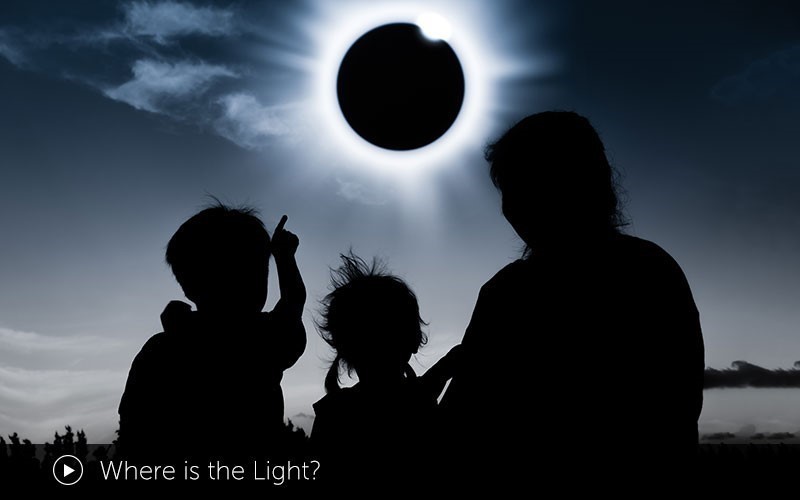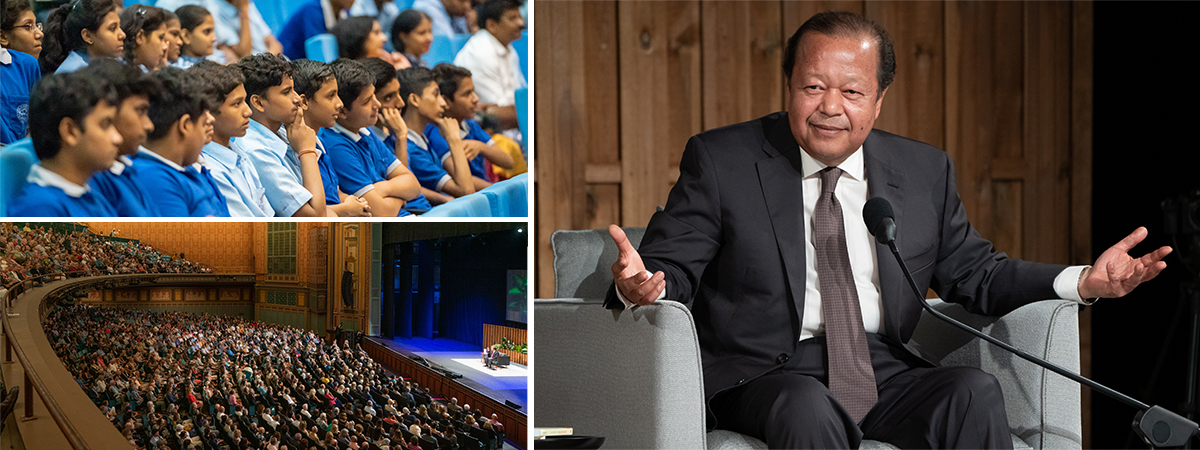Topics
 00:02:21
Thirst and Focus
Video
Duration : 00:02:21
Be still, so that the peace can find you.
00:02:21
Thirst and Focus
Video
Duration : 00:02:21
Be still, so that the peace can find you.
Live your life with a thirst and a focus and you'll succeed at whatever you want.
Find the water—the water that dwells within you. The answer that is waiting to be recognized. You are looking for peace and peace is looking for you. And what do you need to do? Be still. Stop running around. Be still, so that the peace can find you.
You have in you the love that you've been looking for. You have in you the joy that you have been looking for. You have in you, the truth that you have been looking for. You have in you the divine that you have been looking for.
-Prem Rawat
 00:15:44
Where is the Light?
Video
Duration : 00:15:44
Is the light there because you removed all the darkness? Or is the light there b...
00:15:44
Where is the Light?
Video
Duration : 00:15:44
Is the light there because you removed all the darkness? Or is the light there b...
We go to someplace very nice, quiet, beautiful—and I have heard it more than one time, “Oh, look how peaceful it is.” Is peace a look? Is peace a sound; is peace an environment? Or is peace a feeling that emanates from inside a human being? A state of being. Being. Not thinking, being.
And is that state of being, in itself, real? Or is it when all the problems have been taken away, does it manifest? Critical question!
Because what do we do? We think our happiness is not something in itself; our happiness is a result of removing our problems: “If we remove our problems, we’ll be happy.” So, all day long we chase “trying to remove our problems, trying to remove our problems.”
But, no, it doesn’t matter how many problems you remove; if the state of happiness, the state of joy, is something in itself, unless you have brought that in...? Because some things are absences; just, that’s what they are!
You don’t have to bring in darkness, do you? Do you have to invite it? Do you have to go, “Darkness, here, your darkness....” You don’t have to carry a match. And you don’t have to have a candle. All you have to do is, whatever the source of the light is, put it out. And, ta-dah! And there it is!
A long time ago I went and saw a solar eclipse with my family. It was in Mexico, a long, long time ago. And it was bizarre. It was just, it was really, really bizarre.
And it started—and it was in the middle of the afternoon. Just before that, the sun had been shining.... Birds were going about it; it was quite warm; everything was what it was—a typical Mexican day.
And then the eclipse began. And slowly it just got darker, and darker, and darker, and darker, and darker. And all of a sudden it went completely silent; all the birds stopped singing—just went dead silent. And it got darker. And it was like, “Oooh-whoa.” And then, all of a sudden the temperature just started plummeting. It started getting colder, and colder, and colder, and colder.
And then it started getting brighter, and brighter, and brighter, and brighter. And then, everything was fine. It went to normal; the birds came out, “Ah-yab-che, che-che-che!” They were—they were like, “Whoo-whoa, what happened?”
So, when—but there are certain things that, it’s just an absence. That, and nobody had to turn on the air conditioning. Nobody had to dial a dial to make it colder. No, as soon as the sun was eclipsed, all that started to happen. Darkness started to come in.
So, the question becomes, “Do”—you know that when there is light, there’s no darkness! So, “Is the light there because you removed the darkness? And that’s why there is light?”
Now, be careful how you answer this. Because on the face of it, it’s a very simple question—“Is the light there because you removed all the darkness? Or is the light there because you turned on some source of light and the darkness automatically disappeared?” You know this!
So, surely you, if you know this, you must never get sad. You must never be un-, yeah, unhappy...? But on the contrary, even knowing this....
There are certain things, we act a certain way. And we act a certain way, not because of our wisdom, but because of our sheep behavior. Because, this is how we were told to act. This is what we have learnt—from the generations of our parents, of our friends, of our teachers, of our neighbors. There it is: “Get rid of your problems and you will be happy.”
People pay, (hah-hah), really, really good money to go sit down in these training sessions, where some guy gives you a whole schmiel for four days, five days, of how to get rid of your problems. The question is, “If you could remove the darkness by any means, what makes you think that guarantees there will be light?”
Removing the problems becomes a problem for the human being. Oh, by the way, this is nothing new. This is not a 2018 fad.
So many variables in life, but one constant, and that’s enough. Knowing that is futile to remove darkness; it cannot be—it is easy to bring in the light. It is futile to remove all your problems, because you won’t be—they just—because, you see, problems have always been there. And they are the same ones.
They’re the same ones, and they just hover, looking for a victim. Before you, they were plaguing your parents; before them, they were plaguing their parents; before them, they were plaguing their parents; before them, they were plaguing their parents—and so on, and so on, and so on, and so on.
Same problems attacking people the same way. Before there were airplanes, people were missing their ships. Before the ships, they were missing their buses; before buses they were missing their stagecoaches. Before stagecoaches, they were in a sorry state of affairs when their horse ran away.
For me, I want enough grace in my life to hang onto the wisdom—enough grace in my life to hang onto what I know is right. But grace doesn’t come without effort. You create your future. Remember that—I’ve just told you your future, hundred percent! “You create your future.” Be conscious, be real, whatever you do.
Go forward with a heart full of gratitude every day. Understand—I know it’s difficult. Everything is difficult because of our concepts, of our ideas: “Oh no, oh no, oh no, oh no, what’ll happen to me; what’ll happen to me; what’ll happen to me; what’ll happen? What I’ll...?” But, that’s what fear does.
What has happened to you? You probably wondered that: “What will happen to me,” the first day you were put in the school, in the kindergarten, isolated from your parents. And you wondered that, “What’s going to happen to me?” After that, so many days you have wondered, “What is going to happen to me?”
But you’re here. You’re still here! Now you look back at it, of course, and go, “Heh! That was nothing!” Well, now you can say it, “it was nothing.” But that was everything to you when it was happening, wasn’t it? It’s like, the biggest mountain. That’s how we are!
Don’t live in fear—but with the courage, wisdom! You have to garner these if you want stupidity to go away. Because if there is no wisdom, guess what it’ll be replaced by—that there’s a space for it...? And there are two things that can occupy that same space: either it’s wisdom or stupidity, that....
And stupidity, in dimensions, is identical to wisdom. And it fits like a glove, into that same space as wisdom. So if you don’t have wisdom sitting there, guess what’s going to be sitting there? Stupidity. It doesn’t need any other shape. It’s like a coin. One side is one thing; one side is the other thing. It doesn’t need to be a different shape.
Externally, maybe it looks different on the stamp side, but.... And if you cut it? If you take a coin that has two sides and cut off one side, how many sides have you got left? “Yeah, two minus one is one, right?” No! It’ll still have two sides of it.
So, in life, darkness on one side light on the other. That’s wisdom. To just think it’s only darkness on both sides is stupidity. Wisdom is, “Okay, this is stupidity—and on the other side, has to be light.”
And in that light, you thrive—you thrive! Up till the last day that you are on this earth, you thrive.
- Prem Rawat
 00:06:51
Collecting Joy
Video
Duration : 00:06:51
If you start seeing reality in what is a dream—no problem: reset.
00:06:51
Collecting Joy
Video
Duration : 00:06:51
If you start seeing reality in what is a dream—no problem: reset.
You have even made growing old a problem for yourself. It’s not a problem. That’s just what happens. You know, that’s just what it is.
Ask any person who has restored a car. When you’ve got a nineteen-twenty-nine Model T Ford, and you’ve restored it, don’t go driving it like you would have back in 1929, trying to, you know...?
What—what gave us the hotrods? It was prohibition. They were running—they were bootlegging; they were running all the booze in these cars. And they wanted these cars to be as light as possible, so they removed the hood; they removed the mudguards; they removed as much as they could, to lighten the car up, so it could outpace the cops.
And people liked that so much, that even when they stopped the prohibition, people kept the cars that way.
You know—you know, you won’t drive an old car like that. You drive it gingerly, nicely—because it’s old. It doesn’t mean you’re not going to drive it; of course you’re going to drive it. And that doesn’t mean you’re not going to appreciate it; of course you’re going to appreciate it. It’s beautiful in its own way.
I had one, and I used to sit down in it and just look at it, you know, it’s like, “Wow, look at this thing.” For the gas gauge, it was right on the dashboard in the middle, and it was attached to the gas tank; the gas gauge was actually attached to the—and you could see the gas.
And what it was, was a spline that was twisted, and on this spline was mounted the gauge—that went from “full” to “and half,” and all those markings. And there was a cork in it.
And as the gas went down, this thing rotated like this, because it always floated on top of the gas. When it got to the bottom, it said, “E.” And then when you filled it all the way up, it rotated like that; it went to “F.” And when you drove on the road, you hit a bump, and the gauge would go like that, because the gas was doing that.
And then, even though the concept wasn’t of a cruise control, but it actually had a throttle lever. So you got going, and you took it, and you put it where—because you didn’t want to push that gas all the way. But, just, you’re driving along, and you could tune the car. You could advance the timing, retard the timing. You could change the carburetor settings.
So, you got it going to about fifty miles an hour, and then you moved these levers to change the timing and make it a little bit richer, or make it a little bit leaner on the carb. And pretty soon, the thing will start accelerating. And you’d go one mile an hour faster, another mile an hour faster. And they were just a blast. You know, and you’d hit the horn, and it went, “Arrrarghk!”
But you would drive it very gingerly. And it’s like, “Oh, no, it’s a problem.” “What is the problem?” “Oh, I can’t—I have trouble walking; I have trouble seeing; I have....” Get a nice chair at home; park yourself; bring the TV really close up, to where you can see it....
What is the purpose—to be normal or enjoy your life? No, but you, everybody wants to be normal. “And, nah, no, no, keep the TV over there, and see if I can see it....” So you’ve got binoculars, uh-huh.... And what for?
So, garner focus in your life; garner clarity in your life. Collect that joy in your life. Those are the things that are real. Everything else comes, goes, comes, goes, because it’s only a...it’s only a dream.
Sometimes the dream is good, and then sometimes the dream is not so good. Those who don’t go jumping up and down when it is good and lamenting when it is not so good, have a smoother sail in life.
If you get off that tack and you start seeing reality in what is a dream—no problem: reset. No problem! It’s not like, “Oh my God. Oh my God. Oh-my-God; oh-my-God. God’s going to take off points for that. There goes another day in hell. I mean, and my goodness, you know?”
No! No, no, no, no, that’s all fear. Hell is right here; heaven is right here. If you’re not in heaven, guess where you are? It’s as simple as that! It’s simple math!
It’s simple math. It’s a simple math. “Know. Know”—not believe. Know where you are, always. It’s all you need. All you need.
- Prem Rawat
 00:10:22
Hopes and Dreams
Video
Duration : 00:10:22
“Receive the gift, the blessing of the breath—and there is a thing that starts t...
00:10:22
Hopes and Dreams
Video
Duration : 00:10:22
“Receive the gift, the blessing of the breath—and there is a thing that starts t...
So, one day I’m thinking about hope. So I say to myself, “Well, what is hope? What’s hope?” So I grab my trusty iPad, (I’ve got a dictionary app), type in “hope.” I was standing up. I was actually standing in my office.... Yeah, I was going to, “Some inspirational meaning will come out of this dictionary....” And what it says is, “A desire to have your dreams fulfilled.”
So I sat down! I thought “hope” was this gigantic thing! It’s not! All it is—I’m not talking about whether we need it or not—but I’m just talking about what hope is. According to the dictionary, it’s “a fulfillment of our dreams!”
As human beings, we are the most unqualified creatures to have a good dream. Our dream is very, very trivial! What do we hope for? “I’m half an hour late to catch my flight, and I’m hoping the flight too is half an hour late.” That’s your—that’s your dream? That’s your hope? You’re walking down the road; you see a very beautiful girl—and what’s your hope?
You know you didn’t study in school, in the class, for that particular year—farted around. Well, you go to take the test, and you “hope you pass!” (I’m just talking about mankind’s hope—mankind’s dream! How can you talk about mankind’s hope if you don’t understand what mankind’s dream is?)
So this “fulfillment of dream” almost seems to be this entire anti-nature twist that we want accomplished—an exception to the rule, not the rule itself. We want exceptions.
That girl that’s walking down the road, you want her not to pick all the eligible people in this world, but you—when you know you’re not eligible. “Exception to the rule.”
So, our dreams, our prayers to even our God, are asking for an exception. “I don’t want to work. I don’t want to do anything; I don’t have enough brain power to make any money—but God, make me rich.”
When wishful thinking starts to merge with perceived reality, weird things happen. So, there we are; we’re walking along in the path of our life, and we just, “I want this, and I want this, and these are our hopes”—hopes!—the exception to every rule that has been made. And if it wasn’t for those rules you wouldn’t be here.
Bring together all those elements, come out of this wall, receive the gift, the blessing of the breath—and there is a thing that starts to happen, and it’s called “life.” This thing starts to move; this thing can think; this thing can grow; this thing can appreciate; this thing can laugh; this thing can understand; this thing can do amazing things. It’s called “life.”
And ninety percent of you will ponder, most of your life, “Why does it have to end?” See, because all your life you have thought about the exceptions, not the rules—because your hope is actually tied to the exception!
What is your hope? “I hope I’m going to die when I’m eighty years old. I hope I die when I’m ninety years old. I hope I die of old age!” I’ve heard that: “I hope I die of old age!” Now, tell that to Death! You won’t find it anywhere to have a conversation with, “And, hey, when are you coming for me?”
Every morning that you wake up, you wake up with two possibilities. And every moment that you live on the face of this earth, you always live with two possibilities—one is you’re alive, and one—you could go.
You don’t understand life. You attempt to make some kind of understanding happen in your brain about what death is—but you don’t understand death either.
So, heaven? In you. Hell? In you! Confusion, in you. Clarity, in you. Anger, in you. Kindness, in you! Sadness, in you! Joy, in you!
Ignorance, in you; knowledge, in you. Do you really get that? Naah. Yeah, and see that—that’s the problem! That—and yeah, and see, that is the problem. Well, if you really got that, your entire equation would change!
Because right now, “You are the cause of my anger. You are the cause of my anger; you are the cause of my anger; you are the cause of my anger.” And when you start to understand yourself, it’s like, “No, I am the cause of my anger.”
“You are the cause of my joy; you are the cause of my happiness.” And no, when you understand that, “I’m the cause of my happiness.
“You may be a catalyst, but I’m the cause of my happiness.” (Some people are not swallowing this; “I have never operated like this. And I don’t understand what you’re saying.”)
This is what knowing yourself is all about! That’s what enlightenment is all about.
Neither abandoning this world, nor accepting this world, has anything to do with your happiness.
- Prem Rawat
 00:04:24
Freedom from What?
Video
Duration : 00:04:24
When clarity settles, the heart becomes full, then joy dances with you and you d...
00:04:24
Freedom from What?
Video
Duration : 00:04:24
When clarity settles, the heart becomes full, then joy dances with you and you d...
Do I feel so fragile in my world that I feel that without the concepts, my house is weak? Is that why I need them?
Or can I be free? That word, "freedom"—freedom from what? Ask yourself, "Freedom from what?"
Now, you think.... When I talk about the inmates, obviously they see bars all day long. Goodness, the entire time I was in prison visiting them, that’s what I saw too—bars here, and bars there, and bars there and bars there, and bars there and bars there. It all kind of....
The only place where there weren’t bars was the front door—which only brought you to a little reception room, which was a waiting room. To go past that towards the prison, there were bars. And not one—two.
You came through one when they let you. Then you went to the security room, which was in the middle. And only when you had cleared security, that first door closed; second door opened, and you could go through. And then that’ll lead you to a hallway where they handed you your credentials, the one, the pass that you had to wear. This is the same in every prison.
Then you go somewhere else, and they have to open the gate—and they have to open, and a, “Who is it? Who is it?” And, “Who, what?” And, “You have to show your”—“It’s okay; I just was....” “Okay, okay, you can go.”
But one bar after another, after another, after another, after another, after another—well, you don’t live like that, do you? Do you? You don’t have any bars in your life, do you? Nothing that holds you back, right?!
So what’s the difference? You’re locked up too. You don’t think so, but you’re locked up too! And so far you’re locked up, there’s no difference between you and the inmates. The only difference is, they wear orange; you don’t. Unless somebody’s wearing orange here. That’s pretty much the color.
But when all that is gone, and when clarity settles in, heart becomes full, human beings are full of gratitude, then joy dances with you, and you dance with the joy! That elation wells from within—and it’s not conceptual. Not conceptual, not an idea, not a thought, but something very real, that you can begin to rejoice that you’re alive, that you breathe.
- Prem Rawat
 00:05:28
The Art of Enjoyment
Video
Duration : 00:05:28
Living your life consciously is the most fun a human being can have.
00:05:28
The Art of Enjoyment
Video
Duration : 00:05:28
Living your life consciously is the most fun a human being can have.
Jessica Zweig:
You just came out with this new book, Peace Is Possible: Thoughts on Happiness, Success, and Relationships for a Deeper Understanding of Life—such a beautiful title. What was the inspiration of this book, if I may ask?
Prem Rawat:
Well, again, you know, it’s just taking a very, very simple message—and, you know, the message that has been around for a long, long time that always gets shared by people, even before there were books—was verbally, the stories.
And so, it is taking these little stories that have been around for a really long time, and then tying this message of knowing yourself to those stories of the intricacy of everyday existence to the simplicity of those stories—and how the simplicity of those stories brings on a message that touches the heart.
That it’s not about.... I mean, something that happened at a book fair—these two gentlemen who had just come from prison, who had just been released from prison, came to the book fair. And they were walking around and they were like, “Ahhh.” They came over to the stall where the Peace Is Possible book was and they were like, “What’s that? What’s, what’s that all about?”
And somebody said, “Well, here it is; read it.” And the person started reading it, and he just, tears started coming from his eyes. And his friend said to him, says, “Why are you crying? Why are you crying?” And he said, “You read, read this book; read this book.”
And it touched them. And it touched them so sweetly and so gently. Because the message is there. There is a message that touches your heart. Everything that we do touches our mind, but there’s a message that touches your heart.
And I have tried to take this book, Peace Is Possible, and give that message that touches your heart a space—in this very, very busy world, in this incredibly frantic world, giving that message that touches your heart a space, a little page, a little, you know, period, a comma, an exclamation mark. And that’s what this book, Peace Is Possible, is all about.
Jessica Zweig:
And it’s beautiful.
You have a lot of quotes in the world, as an author and a speaker and a thought leader. And I, I’m a huge quote fan. I love them; I put them in all my presentations; I share a lot of my own quotes on Instagram; I quote people all the time; it’s my thing.
And I was, of course, looking at some of your quotes. Because you have been listed as one of the top one hundred most spiritually influential people alive today, along with Eckhart Tolle and Tony Robbins and Gabby Bernstein, Bruce Lipton. It’s pretty incredible. Just, thank you so much for, by the way, being on my show.
And there was one quote that you have said that really struck me, which is, “Living your life consciously is the most fun a human being can have.”
And fun, for me, is a core value for life: “If you’re not having fun, what’s the point?” I think that it’s the true measure of success—is how much fun we are having.
Can you talk about what that—what that means to you, to live a conscious life, to find that fun as a human being?
Prem Rawat:
Imagine being in a beautiful park—I mean, just gorgeous—the flowers are beautiful; the ponds are beautiful; the trees are beautiful. And all of a sudden you hear a noise. You don’t know what it is. You’re not aware of this noise and all of a sudden you’re frightened, and it jostles you.
Versus you’re taking the same walk and you go, “Oh! That’s a little bird! Oh, that’s, that noise is coming from that little frog that’s moving around.”
One, you don’t know what it is versus know what it is. And when you know what it is, it is so much fun! I mean, it is so much fun because now you don’t have to be in fear of where you are and what is happening. You are enjoying every step, every day.
The outcome of today is certain because you know what it is all about—rather than uncertain and “I’m going to try to keep my fingers crossed and make good things happen.” Well, good things are happening all the time.
You know, people say I’m spiritual—so, a lot of—involved with spiritualism, but I’m not. To me, what I try to tell people is, “You have to know. You have to know; you have to be aware. Not believe.” And believing is okay; it has its place. But at some point in time, you have to come out of the field of believing and go into the field of knowing.
And I am all for knowing. And knowing and understanding, being conscious on this road of life, now you know what that is that’s making that noise and you can enjoy it! And it’s like, “Ahh! I know what that is. That’s just a little froggie! It’s okay! Here I go!”





